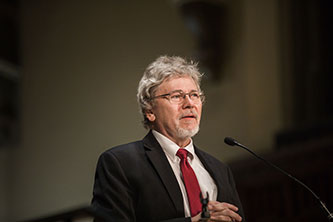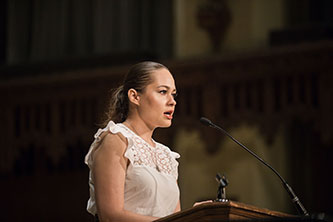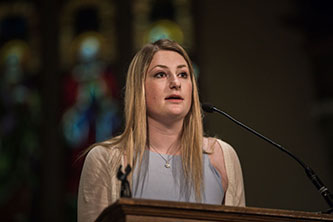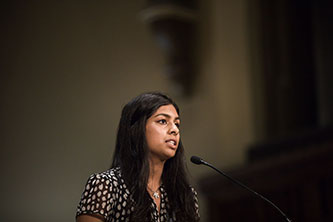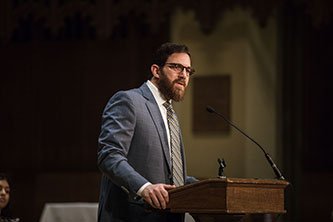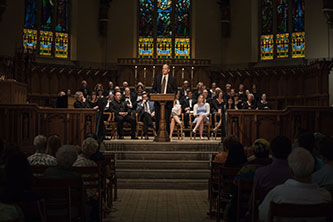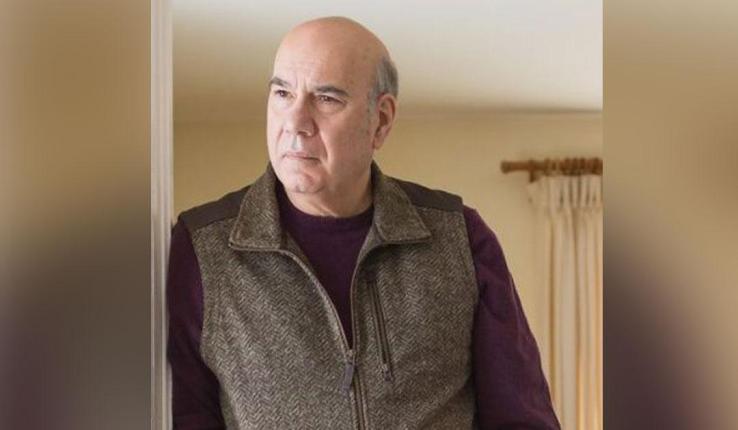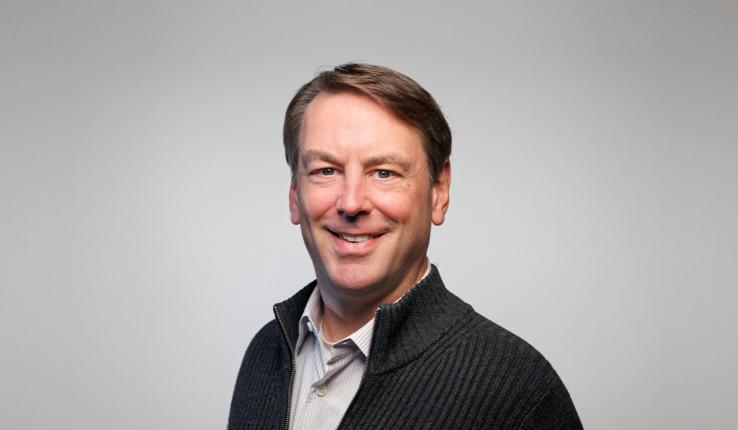Religion Scholar Stephen Prothero Delivers 2018 Baccalaureate Address
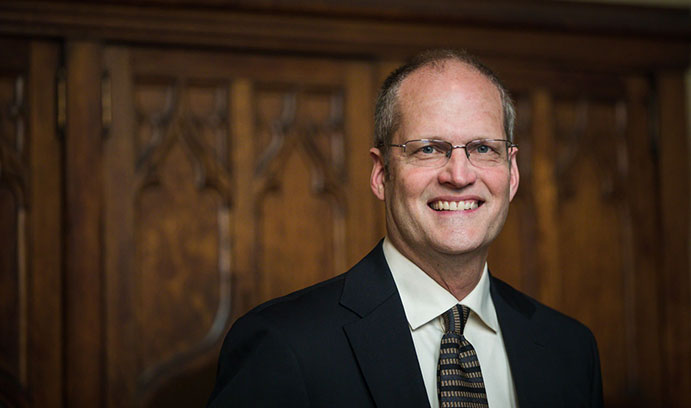
"Today I want to speak in praise of wandering. Along the way I want to convince those of you who are anxious about not having a plan for the rest of your life to stop beating yourselves up about it,” said Stephen Prothero, the C. Allyn and Elizabeth V. Russell Professor of Religion and department chair at Boston University, during Lehigh's 2018 Baccalaureate Address.
In preparing to deliver Lehigh’s 2018 Baccalaureate Address—his first—Stephen Prothero, the C. Allyn and Elizabeth V. Russell Professor of Religion and department chair at Boston University, asked a colleague for advice.
“[He] told me that his rule is to say just one thing. Then, violating this rule, he told me to try to tell the truth. So here are my marching orders: Say one thing, try to tell the truth, and somehow do that in under four hours,” Prothero said to the crowd of graduates, friends and families gathered Sunday in Packer Memorial Church. “So here is my one word of advice—two words, actually: Get lost.”
Prothero, the author of several books that have been translated into eight languages, explained that by this he meant for graduates to “go explore, go someplace new, try something different, lose yourself.”
Friends and family often pepper college graduates with questions about the future, said Prothero, and many graduates might have answers at the ready.
“But even those of you who have a plan and are executing it with perfection are going to find yourselves lost sooner or later and struggling to find a new way forward. Life has a way of doing that,” he said.
Prothero detailed his own “fabulous” postgraduate plan, in which he would move to Washington, D.C. and work on Capitol Hill, and how that plan—and several subsequent plans—went awry. His path led him to a Ph.D. program in religious studies—“I have no clear memory of why I went, but I think it had something to do with desperation and a vague feeling that now might be an appropriate time to improvise”—and eventually to a university faculty position.
“When I moved into my office, I thought I might have heard God laughing,” he said.
The Significance of Wandering
“To wander is to move, without plan or destination, into the unknown, and to open yourself to surprises,” Prothero said. “A wander can be an epic journey, but a wander can also be everyday—the route that you walk through a secret garden or down the avenues of a new city, accompanied by the surprising sights and sounds it offers up to your imagination. But you do not have to leave home to wander. You can let your mind wander while showering, while lounging in your favorite chair, or while listening to a Baccalaureate address that is threatening to go too long.
“The word ‘wander’ carries with it the sense of motion, but what distinguishes it from related words such as ‘journey’ and ‘travel,’ is that the motion involved is said to be without meaning or purpose.”
A wander, said Prothero, is a drama in three acts: the escape, the adventure and the return.
“This three-part choreography—out and around and back again—is rarely as simple as this outline might suggest however, since after you wander home, you might well find yourself wandering out again,” he said.
The world’s religions, Prothero said, focus on preventing individuals from getting lost and finding them when they do. Secular institutions, too, “command us to walk this way, talk this way, love this way, coloring inside the lines.”
Instead, said Prothero, “the alternative I want to offer today is that wandering is more grace than sin, more opportunity than punishment. Or, to put it in the context of this Commencement weekend, not to know what is going to happen in life is, in my view, a gift rather than a burden.”
The Four Virtues of Wandering
Prothero detailed what he called the four virtues of wandering: “four reasons to get lost.”
The first reason, he said, is that it is natural to us.
“To be human is to wander. Well over 99 percent of the millions of years human beings have spent on earth, we have wandered the globe as hunters and gatherers. So wandering is literally in our DNA, passed down over millions of years of foraging. Our memory of those years has been obscured by the rise of agriculture and with it settling in homes and then towns and cities, but something inside us still rebels when we hear the gospel of the straight and narrow,” he said. “... To wander is to participate in this long human story and to write our own epic in turn. We wander to find our own humanity by entering imaginatively into the lives of strangers and to lose ourselves in the natural world, out of which we were made and to which we will all return.”
The second reason to wander is that wandering is resistance, Prothero explained.
“To wander is to assert our humanity in the face of those who would seek to dehumanize us. We wander to feel free, to dispossess ourselves of day-to-day routines, to liberate ourselves from conventions impressed upon us by society and from identities imposed upon us by families and friends, coworkers and others.
“... The Industrial Revolution seduced farmers into factories and then tethered them to assembly lines. Workers in our post-industrial economies are tied to email threads and Instagram and Twitter feeds, whose algorithms channel our thoughts and experiences down the paths designed by computer programmers from Palo Alto to Bangalore to Moscow. In our online attention economy, designers work hard to make their apps and websites sticky, which is to say that turning users into addicts is a feature of their designs, not a bug. So we should not be surprised that like a controlling boyfriend or girlfriend, they demand our attention, always and everywhere. They track our every move and report our every keystroke. … Wandering is a way to liberate ourselves from that cage, to resist attempts to turn us into cogs in corporate or governmental machines.”
Reason number three, said Prothero, is that wandering fosters creativity and innovation.
Virtually all of the world’s religions, he said, were founded by wanderers.
“Obviously religious founders wander away from the dogmas in which they were raised,” he said, “but their restless searching for new solutions to human problems also got their bodies up and moving.”
Poets, novelists, scientists, inventors and philosophers—many of the world’s most accomplished minds did their best work while wandering, Prothero explained.
“Examples abound of epiphanies that came like gifts while the thinker’s conscious mind was adrift in reverie. ... I have no special theories to my name, but I can report that approximately zero of my best ideas have come to me as I was sitting down and concentrating. The focused work we associate with the left side of the brain leads me into useful impasses, but it almost never guides me over or around them. The a-ha moments come when I am waking up or going to sleep,or driving long distances or taking a walk.”
The fourth reason, Prothero said, is that “wandering is play, and play is good.”
Play, he explained, “remains suspect in contemporary America. … But we don’t seem programmed to work eight hours a day or to live 24/7 in the real world. In fact, we seem programmed to move in and out of it, from real friends to imaginary friends, from concentration to reverie, from work to play.
“... In the flow chart of idleness from work, wandering rubs shoulders with slackers rather than the hard workers my Scandinavian ancestors taught me to emulate. But wandering is a sort of work. It produces something … and on occasion it can do some of the hardest work of all: Liberating us of the tyranny of those voices of parents and gods and friends and governments that tell us with authority and sometimes with force of power, who to be, what to think and how to live.”
Returning Home
Prothero admitted that he is a homebody who loves to wander but loves his home, too.
“Perhaps that is why I see homecoming, the theme of the beautiful hymn we just heard, as wandering’s third and final act,” he said. “We humans do not want simply to escape from home and to have an adventure. What we want is the sort of home we can leave, and then return to and leave again. We want a home that does not imprison us, that wishes us well when we get in a wandering way and welcomes us back when it is time to return, a home that gives the sort of freedom to its daughters that it has in past only given to its sons.”
Sharing the “straight-ahead” life story of his recently deceased father, who had “one true love, one career, one job,” Prothero shared his gratitude for the home his parents created for him—”a home I could leave and then return to and then leave again.”
He compared that home to college: “At times it can feel like home, but then on a day like tomorrow it is time to leave. That leave-taking can feel like finding yourself. It can also feel like getting lost.”
Prothero concluded with “the one true thing” he wanted to say: “If by fate or providence you happen to find yourself in a wandering way, try not to listen to the voices in your head telling you that wandering is wrong or wasteful. Nothing is going to die—and something might actually be born—if you turn off your cell phone, leave your routines behind, and go out on a wander without any particular purpose or destination in mind. Allow yourself to ramble without agenda or timetable, out of your apartment or office, and onto the street and down the lane and into the woods or onto the sea or any other place you’d like to be, because there you can be yourself. Allow yourself to get lost. To wander in this way is to be human, but it is also to join God in laughing at whatever plans you had for your day, or your parents had for your life, or your grandparents had for your generation.”
A Longstanding Tradition
Reverend Dr. Lloyd Steffen, professor of religion studies and University Chaplain, explained the origins of the Baccalaureate service in his greeting. The first, he said, was held in 1432 at Oxford University and was intended as a final exam. Graduates were required to stand before faculty and deliver a sermon in Latin.
“Baccalaureate was about three things: exams, religion and competence in classical languages,” said Steffen.
Most universities today, however, have opted to ignore the exam portion of the service and instead have transformed it into an interfaith religious service to honor the various spiritual traditions within the community, Steffen said. In Lehigh’s Baccalaureate service, held each year in Packer Memorial Church, community members from different faith traditions are invited to share stories of faith. This year, four members of the Lehigh community participated:
- Anastassiya Perevezentseva ’18, a double major in international relations and political science who who has been president of the Lehigh University Multi-faith Initiative, represented Christianity. Perevezentseva was also a member of the Newman Center, a Youth Representative for the NGO “Augustinians International” for the United Nations Department of Public Information, an Iacocca Intern in Rome, a TRAC Fellow, president of the Russian Club and vice president of the Lehigh UNICEF Campus Initiative. She will be entering a Ph.D. program in international relations at American University.
- Hope Markman ’18, a marketing and graphic design major with a minor in Jewish Studies, represented Judaism. Markman volunteered in the Center for Gender Equality where she helped lead efforts to address issues on women and spirituality. She was involved with Hillel, studied at Tel Aviv University, was a member of the Epitome yearbook staff, and participated in the student-run design agency, Fusion; Women in Business; and the campus radio station, WLVR. Markman recently received a Jewish Studies Student Achievement Award.
- Aishwarya Suresh ’18, a pre-med student and a member of the Phi Beta Kappa Society, represented Hinduism. Suresh is a published poet, has been a leader in the Indian Students Association, an orientation leader and a member of the Residence Hall Council. She plans to attend the Drexel University College of Medicine this fall.
- Walead Mohammed Mosaad, who is completing his first year as Director of Muslim Student Life at Lehigh, represented Islam. Mosaad is a teacher and researcher of the Islamic sciences and is a visiting professor at the Bayan Claremont School of Theology in Claremont, Ca. He also offers courses in Islamic theology on the online portal SeekersHub. Mosaad has lectured internationally on topics as varied as the inclusion of Muslims as minorities, interfaith understanding and the importance of ethics and spirituality in addressing the human condition. He holds degrees from Rutgers University, the Fath Islamic Seminary in Damascus, al-Azhar University in Cairo and the University of Liverpool. He earned his Ph.D. in Arab and Islamic Studies at the University of Exeter in the U.K.
The service opened with music from South Side Brass and the Concord Chamber Singers. Steffen gathered the community, and Father Christopher Butera, Catholic chaplain and director of the Newman Center, offered the invocation.
Photos by Christa Neu
Posted on:


